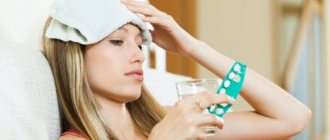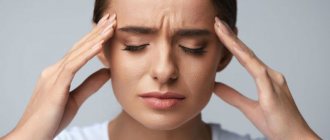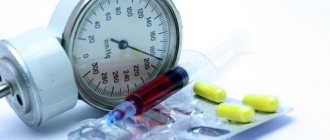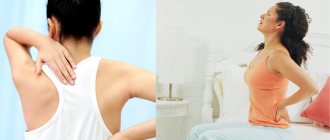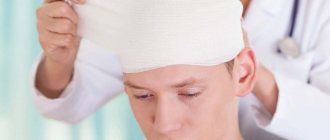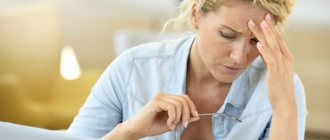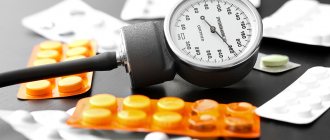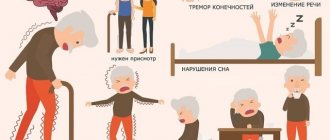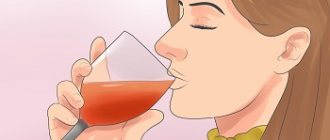Headache during menstruation
Quite a large number of women suffer from headaches during menstruation. This condition is called menstrual cephalgia. The sensations experienced by a woman during this period vary in intensity: from a completely tolerable and unstable feeling of pressure inside the head to severe migraines that can temporarily deprive one of his ability to work. Headaches are often accompanied by nausea, changes in the perception of smell and taste, increased sensitivity to sounds, mood instability and sleep disturbances.
Menstrual pain can occur 2 days before menstruation and 3 days after it. They usually do not pose a health hazard, however, if cephalgic episodes recur, you should consult a doctor. The reason for this condition is a sharp change in hormonal levels during the menstrual cycle, which is especially typical for women suffering from disorders of the hypothalamic-pituitary system, which regulates the production of hormones. The main causes of headaches during menstruation include the following:
- a sharp drop in the level of the hormone progesterone;
- change in water-salt balance;
- menstruation-related changes in prostaglandin levels;
- chronic iron deficiency anemia, which is often observed in women with heavy and prolonged menstrual bleeding.
Eating disorders with excess carbohydrates and saturated fats in the diet, and excessively frequent consumption of strong coffee predispose to the appearance of headaches during menstruation. Cervical osteochondrosis, blood clotting disorders, and previous head and neck injuries also increase the likelihood of menstrual cephalgia.
Up to contents
Menstrual migraine
What is a migraine anyway?
Migraine is a brain disease (often hereditary) that causes very severe headaches. The pain lasts from 4 to 72 hours. It is accompanied by nausea or increased sensitivity to light and sounds. The pain is such that it interferes with daily activities.
Is menstrual migraine common?
Yes. Menstrual migraines are very common. This is a significant medical problem. Two-thirds of women with migraines report that attacks are more severe during menstruation. At the beginning of the cycle, the likelihood of an attack is 2-3 times higher than usual. Attacks that occur during this period are more severe and prolonged [2].
Why does menstruation make migraines worse?
Migraine is very sensitive to fluctuations in the level of female sex hormones. Before menstruation begins, estrogen levels drop sharply. This triggers the development of an attack. Proof of this is the fact that most women do not experience migraines until adolescence. In childhood, the ratio of boys and girls with migraine is the same. And in adulthood, the prevalence of migraine among women is already three times higher than among men [3].
How to treat menstrual migraine
In two ways [6]:
- relieve an attack that has already occurred;
- prevent new attacks.
How to relieve a menstrual migraine
It is most effective to relieve (stop) attacks with specific anti-migraine medications - triptans (read the article about them: Triptans). Non-steroidal anti-inflammatory drugs (NSAIDs) can also be effective; you can read about them here: Non-steroidal anti-inflammatory drugs) and ergotamine preparations.
How to prevent a menstrual migraine attack
Prevention medications are prescribed 1-2 days before the most likely day of an attack. This type of preventive treatment is called “mini-prevention”. Triptans, NSAIDs and magnesium preparations are used for it. All of them are effective if they are prescribed immediately before the onset of an attack, and treatment lasts 5-7 days.
Hormone therapy produces conflicting results. Some women note that when menstruation is stopped using oral contraceptives or modern intrauterine systems, migraines also go away [4]. Preventing the fall in estrogen levels using estrogen-containing gels and patches has shown a positive effect in the prevention of menstrual migraine in several small studies [5].
Menstrual migraine may reflect hormonal imbalances. This disease is very common and greatly reduces the quality of life, but there are always solutions. Don't endure the pain, consult a doctor!
Literature:
- International classification of headaches, 2nd edition (full Russian version)." , 2006, 380 p.
- Tabeeva G. R. “Menstrual migraine.” // Ross. honey. magazine 2008, vol. 16, no. 4, p. 195–199.
- Tabeeva G. R. Gromova S. A. “Estrogen and migraine.” // Neurological journal. 2009. No. 5, p. 45–53
- Allais G., Castagnoli Gabellari I., et al. "Oral contraceptives in migraine therapy." // Neurol Sci. – 2011. – v.32. — Suppl 1. — S135-139.
- Almén-Christensson A., Hammar M., Lindh-Åstrand L., et al. "Prevention of menstrual migraine with perimenstrual transdermal 17-β-estradiol: a randomized, placebo-controlled, double-blind crossover study." // Fertil Steril. – 2011. – v.96. – p.498-500
- MacGregor EA "Prevention and treatment of menstrual migraine". // Drugs. – 2010. – v.70. – p.1799-818.
Rothrock JF "Oral triptan therapy." //Headache. – 2009. – v.49. – p.1399-1400
Photo by Polina Zimmerman from Pexels
Headache in a pregnant woman
The causes of headaches in women during pregnancy and lactation may be different. In some cases they are associated with changes in hormonal levels, in others – with exacerbation of osteochondrosis of the cervical spine. Only a specialist can understand the true causes of the pathological condition. The complexity of this situation lies in the fact that during such a period the choice of medications against headaches is very limited. Therefore, only a doctor can prescribe the drug.
Up to contents
Why girls may have headaches during and before menstruation
In fact, the mechanisms of development of headaches during menstruation are not fully understood. The most likely reason is considered to be a change in hormonal levels, on which your well-being largely depends.
Arterial pressure.
If it becomes high1 or low, you may experience headaches, dizziness and generally feel run down. Another reason why headaches occur during menstruation is relevant for girls who experience heavy menstrual flow. If you are on a low-calorie diet, these symptoms may be caused by anemia2. Anemia. Along with the blood, there is a loss of hemoglobin - blood cells that help deliver oxygen to all organs. If not enough iron enters the body with food, as often happens during a diet, then the body begins to suffer from oxygen deficiency, since it is iron that is involved in the formation of hemoglobin. And then the headache is similar to that experienced by a person who has been in a stuffy, unventilated room for a long time.
Edema. Excess fluid accumulates in your body due to changes in hormonal levels. Swelling can cause headaches because it puts pressure on the nerve endings that transmit pain sensations.
What to do for menstrual headaches
Consult a doctor if symptoms are severe
. Frequent and severe headaches during menstruation should be a reason to consult a doctor, regardless of the woman’s age. Consultation with a specialist is also required if the nature and duration of pain changes, new symptoms appear, discomfort persists during the subsequent cycle, or disturbances in the rhythm of menstruation.
Lead a healthy lifestyle
. Women prone to headaches are recommended to take evening walks, follow a daily routine, get enough sleep at night and be physically active. Don't forget to drink enough fluid. It is advisable to limit foods that are difficult to digest and promote fluid retention in the diet, and reduce the number of dishes with “fast” (easily accessible) carbohydrates. It is recommended to minimize or eliminate alcohol consumption and try to give up bad habits. On the recommendation of a doctor, you can go for a medical massage of the back, neck, and head.
Take medications recommended by your doctor
. To relieve headaches, antispasmodics and non-steroidal anti-inflammatory drugs are often used. For concomitant hypertension, antihypertensive drugs are indicated, and for anemia, a therapeutic diet and iron-containing medications are usually prescribed. For migraines, the doctor prescribes the correct therapy: anti-migraine drugs, triptans. Medications should only be taken with the permission of a doctor.
Up to contents
Causes of premenstrual syndrome
Premenstrual syndrome Modern medicine does not yet have complete information about the mechanism of premenstrual syndrome.
There are many theories describing the causes of PMS. First of all, hormonal changes and chemical processes in the brain are distinguished. The course of the menstrual cycle is regulated by hormonal fluctuations. Researchers believe that PMS symptoms may be associated with high levels of estrogen, prolactin and aldosterone, as well as progesterone deficiency.
Certain chemicals in the brain may also play a role in PMS. First of all, we are talking about serotonin, one of the main neurotransmitters. The concentration of this substance fluctuates during the menstrual cycle. Serotonin regulates mood, and when it is deficient, mood disorders and depression associated with PMS can occur. Low serotonin levels also cause fatigue, food cravings, and sleep problems.
Food preferences can also influence the course of PMS. Excessively salty and fatty foods, caffeine and alcohol consumption contribute to the aggravation of symptoms. Low levels of certain vitamins (such as vitamin B6) and minerals are also thought to contribute to PMS.
Women who are obese or who do little or no exercise are at higher risk for PMS. Those who smoke, suffer from thyroid disease, and have low blood sugar are also at risk.
Motrin® for headaches
Motrin® is a complex action drug that helps relieve headaches for twelve hours. This product has a high safety profile and is approved for sale in pharmacies without a prescription.1 To achieve the best effect and maintain the correct dosage, before using it, you must read the instructions and consult your doctor.
Up to contents
The information in this article is for reference only and does not replace professional advice from a doctor. To make a diagnosis and prescribe treatment, consult a qualified specialist.
1 According to the instructions for medical use of the drug Motrin®.
What kind of pain can there be before menstruation?
Experts call headaches before menstruation cephalgic syndrome. You can understand that a headache is related to this issue thanks to the following signs:
- pain in most cases occurs in the parietal region or in the back of the head, is quite intense and brings severe discomfort;
- the pain is pulsating;
- in the eye area the painful sensations are of a pressing nature;
- very sharp and severe changes in blood pressure are observed;
- pain may occur in the heart area;
- the woman experiences nausea, dizziness, and maybe even vomiting;
- there is a lot of sweat;
- May cause depression, irritability;
- the mood often changes abruptly;
- problems with sleep appear;
- a woman gets tired very quickly even from a slight load;
- swelling may occur;
- mammary glands hurt;
- there is a feeling of aching in the lower back;
- before and after menstruation, bloating, flatulence, or even constipation may be present.
If the headache during menstruation or before its onset is regular and very intense, then this indicates a very clearly defined PMS. This phenomenon can hardly be called normal, because it indicates too many hormones. The problem must be treated immediately, as the woman’s condition will only worsen in the future.
Treatment methods
Most women suffer greatly because at the end of the cycle they are bothered by severe pain not only in the lower abdomen. Of course, many of them do not attach much importance to headaches and consider them to be quite normal before menstruation; accordingly, they do not even try to find the cause. It is worth noting: women are sure that such a headache before menstruation does not go away, and there is no point in treating it, because after the end of the critical days, the painful sensations disappear. In fact, this is completely wrong. Pain during menstruation and headaches bring a woman severe discomfort and a lot of unpleasant sensations, especially when her body is most weakened and sensitive to various kinds of changes.
In this regard, it is very important to provide every woman with the most comfortable physical condition. An important role is played by identifying the cause that causes pain both before and after menstruation. In order to do this and begin timely treatment, you need to consult a neurologist. The gynecologist will be able to select an effective drug to normalize the menstrual cycle if there are problems with this. This medicine will help additionally get rid of the unpleasant sensations that bother many women every month. In most cases, specialists prescribe additional vitamin and mineral complexes to strengthen the body and eliminate headaches.
You can get rid of PMS symptoms with the help of properly selected, high-quality hormonal-type contraceptives.
Such remedies will help tidy up your hormonal levels and relieve pain. At the same time, experts recommend being as nervous and worried as little as possible, especially shortly before the onset of your period, because this will only increase the symptoms several times over.
When a woman’s menstrual cycle ends, she needs to rest as much as possible and the amount of physical activity should be minimal. Doctors recommend getting a little more sleep. Of course, there is a certain percentage of women who easily endure their periods, being as active as possible during this period. It is also advisable to spend a lot of time in the fresh air, take time for relaxation, and do breathing exercises.
A woman’s nutrition plays a very important role. At the end of the menstrual cycle, it is advisable to completely eliminate or minimize the consumption of harmful foods. Eliminate fatty and overly salty foods from your diet, and do not eat smoked or pickled foods. In addition, you can make the pain less intense or barely noticeable by giving up bad habits, especially smoking and drinking alcohol.
It is very important for every woman to remember that the best way to prevent pain before the onset of her period is to prevent the problem. Therefore, it is advisable to maintain a healthy lifestyle and proper routine. Alternate rest and physical activity with mental activity. Watch your diet and drink enough fluids, especially when there is very little time left before your period.

